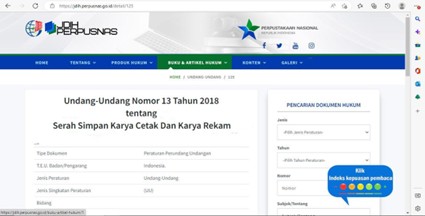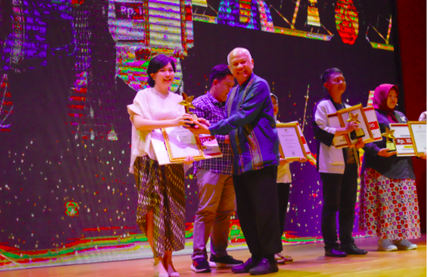Legal Deposit and Its Contribution to The Sustainable Development Goals
15 September 2025
The immense diversity of global societies not only creates a variety of cultures but also produces a variety of published works, such as printed, analog, and digital forms. These works are not just a medium of expression and entertainment; they also transform into being a medium of communication and a gateway for the exchange of knowledge that can introduce us to the identity, history, and civilization of each nation. The strategic function of these works creates an urgency to preserve them. One concrete step that has been implemented is Legal Deposit.
Larivière (2000) defines legal deposit as “a statutory obligation which requires that any organization, commercial or public, and any individual producing any type of documentation in multiple copies, be obliged to deposit one or more copies with a recognized national institution”. In Indonesia, the National Library of Indonesia (NLI) is responsible for the implementation of this regulation. The implementation of legal deposit is not merely a bureaucratic task for NLI, but a strategic action that directly contributes to achieving the United Nations Sustainable Development Goals (SDGs) by safeguarding a nation’s knowledge and civilisation.
Preserving Civilisation
Milan Kundera, a well-known French author, once made a warning statement in his book titled “The Book of Laughter and Forgetting.” In general, he said that:
“The first step in liquidating a people is to erase its memory. Destroy its books, its culture, its history. Then have somebody write new books, manufacture a new culture, invent a new history. Before long the nation will begin to forget what it is and what it was. The world around it will forget even faster.”
Milan Kundera’s statement indirectly reminds us about the urgency to preserve history, culture, and books as one of the products of cultural heritage. In this context, legal deposit plays a strategic role in preventing the worst-case scenario depicted by Milan Kundera.
By collecting, managing, and preserving all published works, NLI acts as a bulwark to ensure that our intellectual and cultural heritage remains intact and accessible for current and future generations. This action is a concrete contribution to achieving SDG 11 (Sustainable Cities and Communities), specifically target 11.4, which aims to “strengthen efforts to protect and safeguard the world’s cultural and natural heritage”. Through Legal Deposit, NLI has an essential role to safeguard and preserve all works produced by Indonesian citizens, or by foreign citizens about Indonesia, thereby contributing to building and protecting the nation’s civilisation.

Advancing knowledge
Besides preserving civilisation, legal deposit also has a vital role in advancing our nation’s education and research. The National Library ensures that all legal deposit works are collected, managed, and accessible for current and future generations as essential references for educational and research development. This is in accordance with the goals of SDG 4 (Quality Education), which seeks to “ensure inclusive and equitable quality education and promote lifelong learning opportunities for all.”
To further develop the quality of education and research resources and also strengthen the contribution to SDG 4, the National Library has a program called “Pemilihan Buku Terbaik” (Best Book Selection). Through this programme, legal deposit works on specific themes are assessed to identify the best book, and the winners are exhibited to the public. This program serves several purposes:
- provides high-quality resources from various themes for education and research
- encourages reading habits, and
- motivates authors and publishers to produce high-quality works.

All in all, the implementation of legal deposit is not merely a task of collecting works but a strategic act of preservation. By safeguarding the nation’s works, NLI simultaneously protects our intellectual and cultural heritage, strengthens our civilisation, and provides the best resources to advance our education and research development. Thus, legal deposit stands as a powerful mechanism that links the preservation of a nation’s heritage to the global agenda of the United Nations.
Contributed by Jusa Junaedi, Librarian, National Library of Indonesia